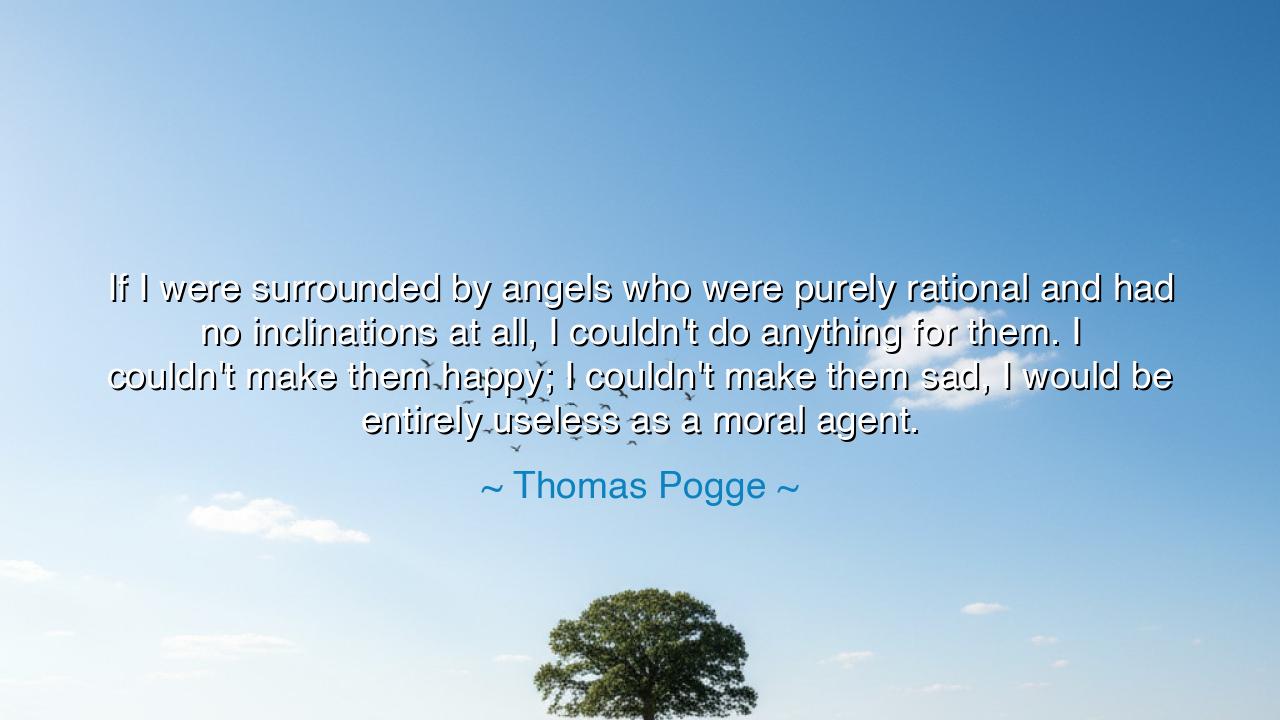
If I were surrounded by angels who were purely rational and had
If I were surrounded by angels who were purely rational and had no inclinations at all, I couldn't do anything for them. I couldn't make them happy; I couldn't make them sad, I would be entirely useless as a moral agent.






Hear the teaching of Thomas Pogge: “If I were surrounded by angels who were purely rational and had no inclinations at all, I couldn’t do anything for them. I couldn’t make them happy; I couldn’t make them sad; I would be entirely useless as a moral agent.” These words, though clothed in philosophy, strike at the very heart of what it means to be human. For Pogge speaks not of angels alone, but of the condition of life itself—of our need for desire, joy, sorrow, and longing, without which morality and meaning wither into nothingness.
The ancients would have understood this paradox well. They taught that the gods of Olympus, though immortal, were restless precisely because they lacked the full measure of human fragility. It is in inclinations—in the pull of love, the pang of grief, the fire of anger—that we discover what matters most. Without such stirrings of the soul, no deed has weight, no sacrifice bears fruit, no kindness heals. For what is it to be a moral agent, if not to act upon the desires and vulnerabilities of living beings? To lift up the broken, one must feel their brokenness; to offer joy, one must know what it is to hunger for joy.
Consider the story of Siddhartha, who became the Buddha. He was raised among riches, sheltered from sorrow, and for a time lived as though among Pogge’s imagined angels—surrounded by pleasures but untouched by suffering. Yet his life was empty of purpose until he left the palace and beheld sickness, old age, and death. Only then, when he encountered the inclinations and pains of mortal existence, did he awaken to his destiny. Without beings who could suffer or rejoice, there could be no path of compassion, no moral way, no enlightenment.
Pogge’s vision also reminds us of the role of our emotions in shaping justice. The cold calculation of reason alone cannot guide a society. A lawgiver who sees only numbers, but not tears, will craft decrees without mercy. A ruler who balances accounts but never feels the ache of hunger will feed no one. It is the union of reason with inclination, of mind with heart, that gives rise to true morality. Angels without inclinations may never fall, but neither can they rise in compassion.
And so we learn: our vulnerability, far from being a weakness, is the very ground upon which morality grows. To be moved by another’s suffering is not a flaw but a sacred gift. To rejoice in another’s joy is not sentimentality, but the highest calling. Were we all cold like Pogge’s angels, we would live in sterile perfection, untouched and untouched by others, condemned to eternal irrelevance. But because we can be happy and sad, we can lift each other, fail and rise, comfort and heal.
The lesson for us, therefore, is to embrace the full depth of our human inclinations. Do not flee from sorrow, for it teaches compassion. Do not scorn joy, for it shows what is worth protecting. Do not despise longing, for it drives the soul toward creation and connection. These inclinations, though they make us fragile, also make us capable of greatness. They allow us to be moral agents in a world where others need our touch, our words, our courage.
Practically, this means we must act: listen deeply to those who suffer, rejoice honestly with those who celebrate, and allow our hearts to move us into deeds of mercy and justice. Cultivate not only the sharpness of reason, but the tenderness of inclination. For a life guided only by cold thought will be clever, but empty. A life guided by both mind and heart will be wise, and full.
Thus Pogge’s words remind us of the hidden power of our humanity: that in our emotions, our inclinations, our fragile bonds, we find our true strength. Without them we would be angels, untouched, untouching—yet with them we become something greater: beings who can bring light into darkness, hope into despair, and joy into the lives of others.






AAdministratorAdministrator
Welcome, honored guests. Please leave a comment, we will respond soon